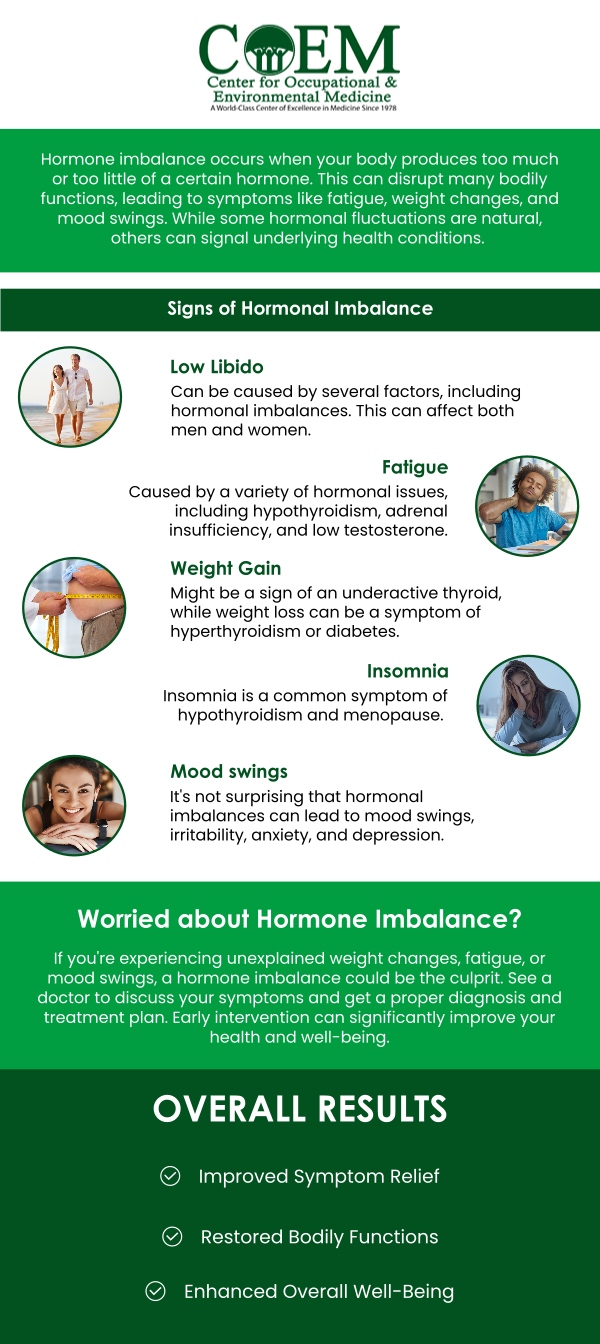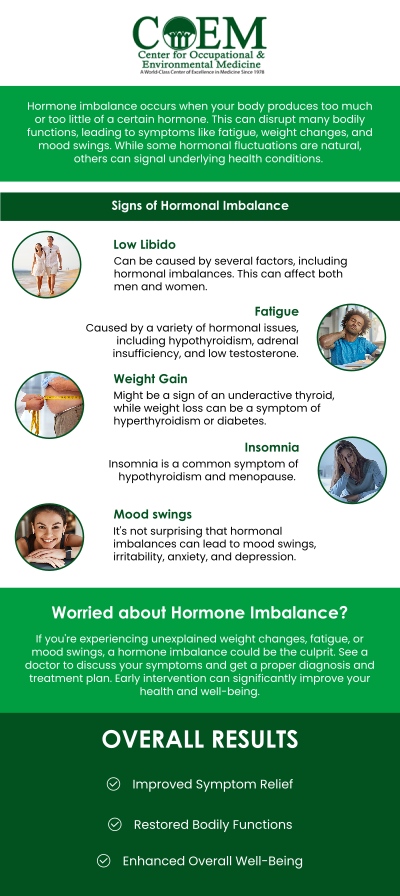Hormone Imbalances in Women: What You Need to Know
Hormone imbalances in women can affect energy, mood, weight, and overall well-being. Fluctuations in estrogen, progesterone, thyroid, or cortisol levels may lead to symptoms like fatigue, mood swings, sleep issues, and irregular cycles. At The Center for Occupational and Environmental Medicine (COEM) in Charleston, SC, our medical team identifies underlying causes and creates personalized plans to restore hormonal balance and improve long-term health. For more information, contact us today or schedule an appointment online. We are conveniently located at 7510 North Forest Drive North Charleston, SC 29420. Patients routinely fly in to be evaluated by COEM, as we serve patients internationally. Find out if you have been exposed, extensive lab testing is available.


Table of Contents:
What are hormone imbalances in women?
What are the common causes of hormone imbalances in women?
What are the symptoms of hormone imbalances in women?
How do hormone imbalances affect mood and mental health?
What Role Do Hormonal Changes Play in Women’s Health, and How Can MedMAPS-Certified Physician Dr. Stephen P. Elliott, MD, Address Them?
Hormone imbalances in women occur when the body’s endocrine system produces too much or too little of specific hormones that regulate essential functions. These hormones, including estrogen, progesterone, testosterone, thyroid hormones, and insulin, work together to maintain stability throughout the body. When one or more of these hormones fall out of sync, physical, emotional, and cognitive symptoms may occur. Because hormones influence everything from metabolism and mood to fertility and sleep quality, even subtle changes can have far-reaching effects on how a woman feels and functions each day. Typically, hormone imbalances develop gradually as a result of natural aging or lifestyle factors that disrupt the body’s internal rhythm. However, imbalances can also appear earlier in life due to chronic stress, poor nutrition, environmental toxins, or metabolic conditions that strain the adrenal and thyroid systems.
Functional medicine doctors at The Center for Occupational and Environmental Medicine (COEM) assess these hormonal patterns through comprehensive testing and clinical evaluation. By reviewing blood, urine, and saliva samples, providers can evaluate hormone levels over time rather than relying on a single-day snapshot. This helps them understand how the hormones are interacting and what adjustments may be needed to bring them into balance. When imbalances are identified, COEM offers natural Bioidentical Hormone Replacement Therapy (BHRT) using oral and topical formulations to gently restore hormonal harmony. These treatments are personalized to each woman’s needs and are designed to replicate the body’s natural hormones without the use of pellets.
Hormone imbalances can be triggered by a wide range of biological, environmental, and lifestyle factors that interfere with the body’s ability to regulate hormone production and metabolism. Chronic stress is one of the most common causes, as elevated cortisol levels can disrupt the balance between estrogen and progesterone, suppress thyroid activity, and reduce insulin sensitivity. Nutritional deficiencies, exposure to endocrine-disrupting chemicals, and certain medications may also contribute to imbalances over time. Women who experience irregular sleep, limited physical activity, or prolonged exposure to environmental toxins may find that their hormonal systems become less resilient. Natural life transitions also influence shifting hormone patterns. Puberty, pregnancy, postpartum changes, perimenopause, and menopause all bring distinct fluctuations that can influence mood, metabolism, and reproductive health. These transitions can sometimes lead to persistent symptoms such as weight gain, low libido, or irregular menstrual cycles when the body struggles to adapt. Genetic factors and family history may further increase susceptibility, especially when combined with autoimmune or thyroid-related disorders. Each woman’s hormonal rhythm is unique, which is why thorough evaluation and individualized care are essential. COEM’s providers specialize in identifying these root causes and may recommend lifestyle adjustments, nutritional optimization, detoxification, and natural bioidentical hormone replacement therapy through oral or topical treatments to restore balance and improve overall wellness.
Symptoms of hormone imbalance can manifest in many ways, often affecting energy levels, emotional state, and physical health simultaneously. Common signs include persistent fatigue, sleep disruption, changes in appetite, and irregular menstrual cycles. Many women also experience weight fluctuations, skin changes, or thinning hair. Emotional symptoms such as mood swings, anxiety, and irritability often accompany these physical signs, making daily functioning more challenging. In some cases, cognitive symptoms like forgetfulness or difficulty concentrating may develop as hormonal communication within the brain becomes disrupted. Hormonal fluctuations can also influence metabolism, temperature regulation, and libido. When estrogen levels drop, women may notice hot flashes, night sweats, or vaginal dryness, while low progesterone may contribute to restlessness or trouble sleeping. Thyroid imbalances can affect heart rate, digestion, and overall energy. These interconnected systems show how closely hormones affect multiple aspects of health, often requiring a comprehensive evaluation to determine the exact source of discomfort. Because symptoms can overlap with other conditions, accurate diagnosis depends on detailed testing and medical interpretation. When needed, COEM providers may recommend natural bioidentical hormone replacement therapy through oral or topical applications to help relieve these symptoms and restore physiological balance.
Hormones play a significant role in regulating brain chemistry and emotional stability. When they fall out of balance, neurotransmitters such as serotonin, dopamine, and more can become disrupted, influencing how the brain processes mood and stress. Women with hormone imbalances may experience heightened anxiety, irritability, or low mood, often without a clear external cause. These changes are particularly noticeable during hormonal transitions such as perimenopause, postpartum recovery, or thyroid fluctuations. For some, the shifts can be intense enough to affect motivation, concentration, and self-esteem. Chronic stress and inflammation also impact hormone activity, creating a feedback loop that can worsen mood-related symptoms. Elevated cortisol levels over long periods can deplete essential neurotransmitters and interfere with the body’s ability to respond to emotional stress. In turn, this imbalance can contribute to sleep disturbances, mood instability, or depressive symptoms. At COEM, functional medicine doctors approach mood-related symptoms by identifying and correcting the hormonal irregularities responsible. Comprehensive testing helps determine whether estrogen, progesterone, thyroid, or adrenal hormones are involved.
Hormonal changes influence nearly every aspect of a woman’s health, from metabolism and reproductive function to energy and mood regulation. Throughout life, fluctuations in estrogen, progesterone, testosterone, thyroid hormones, and insulin affect how the body maintains equilibrium. When these shifts occur gradually, the body often adapts, but when they happen more abruptly or in combination with other stressors, symptoms can appear quickly and disrupt overall well-being. Balancing these hormones allows women to maintain vitality, clarity, and long-term health as they transition through different stages of life.
Board Certified Dr. Stephen P. Elliott, MD, D.A.B.F.M., F.A.A.A.M., F.M.A.P.S., the only MedMAPS-Certified Physician Fellow in South Carolina, provides comprehensive care for women experiencing hormonal imbalances through a functional medicine approach at The Center for Occupational and Environmental Medicine (COEM). His process combines advanced diagnostic testing with years of clinical expertise to understand how various hormones interact and influence each patient’s overall well-being. Using saliva, blood, and urine testing, Dr. Elliott and the COEM team evaluate hormonal patterns in the context of each woman’s medical history, environment, and lifestyle. By identifying underlying contributors such as environmental toxins, nutritional factors, or metabolic stress, they focus on restoring harmony to the body’s natural regulatory systems. This personalized, evidence-based approach helps women achieve greater vitality, improved balance, and long-term wellness.
Treatment for hormonal imbalance is available at The Center for Occupational and Environmental Medicine (COEM). For more information, contact us today or schedule an appointment online. We are conveniently located at 7510 North Forest Drive North Charleston, SC 29420. We serve patients from Charleston SC, Mount Pleasant SC, Summerville SC, North Charleston SC, Goose Creek SC, Ladson SC, Hanahan SC, James Island SC, John’s Island SC, Daniel Island SC, West Ashley SC, Moncks Corner SC, Sullivans Island SC, Folly Beach SC, Isle of Palms SC and all of South Carolina, Nationally, and Internationally. Patients routinely fly into Charleston to be evaluated by COEM and to enjoy this beautiful city, which is a Condé Nast and Travel and Leisure Top Domestic and International Tourist Destination.

Check Out Our 5 Star Reviews


Check Out Our 5 Star Reviews


Additional Services You May Like
- Functional Medicine
- Allergy and Autoimmunity
- Asthma and COPD
- Autoimmune Diseases
- Allergy and Immunology
- Anti Aging Medicine
- Autism and Children
- ADHD
- Bacterial Infections
- Chemical Toxicity
- Candida Fungal Problems
- Cancer Treatment
- Chronic Illness
- Chronic Inflammatory Response Syndrome (CIRS)
- Chronic Fatigue
- Cardiovascular Disease
- Carbon Monoxide Poisoning
- Chelation Therapy
- Depression
- Environmental Medicine
- Ear Ringing and Dizziness
- Fatigue Treatment
- Fertility and Preconception Care
- Gut Health
- Heavy Metal Toxicity
- Hormonal Imbalances
- Headaches and Migraines
- Hormone Balancing (Men & Women)
- Hepatitis
- Integrative Medicine
- Independent Medical Evaluations
- Influenza
- Lab Testing
- Mold Toxicity
- Malnutrition
- Neurodegenerative Disease
- Natural Hormone Balancing For Women
- Preservative-Free IV Therapy
- Stomach Acid Imbalance
- Smoking Cessation Program
- Skin Therapy (Anti-Aging)
- Swine Flu
- Thyroid
- Mold Toxicity
- Vitamin D
- Weight Loss Program
- Women’s Breast Health Formula

Additional Services You May Like
- Functional Medicine
- Allergy and Autoimmunity
- Asthma and COPD
- Autoimmune Diseases
- Allergy and Immunology
- Anti Aging Medicine
- Autism and Children
- ADHD
- Bacterial Infections
- Chemical Toxicity
- Candida Fungal Problems
- Cancer Treatment
- Chronic Illness
- Chronic Fatigue
- Cardiovascular Disease
- Chronic Inflammatory Response Syndrome (CIRS)
- Carbon Monoxide Poisoning
- Chelation Therapy
- Depression
- Environmental Medicine
- Ear Ringing and Dizziness
- Fatigue Treatment
- Fertility and Preconception Care
- Gut Health
- Heavy Metal Toxicity
- Hormonal Imbalances
- Headaches and Migraines
- Hormone Balancing (Men & Women)
- Hepatitis
- Integrative Medicine
- Independent Medical Evaluations
- Influenza
- Lab Testing
- Mold Toxicity
- Malnutrition
- Neurodegenerative Disease
- Natural Hormone Balancing For Women
- Preservative-Free IV Therapy
- Stomach Acid Imbalance
- Smoking Cessation Program
- Skin Therapy (Anti-Aging)
- Swine Flu
- Thyroid
- Mold Toxicity
- Vitamin D
- Weight Loss Program
- Women’s Breast Health Formula










